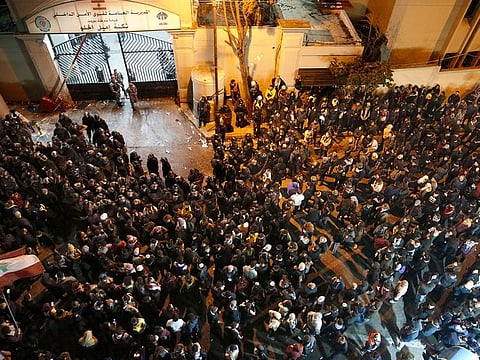Time running out to solve impasse in Lebanon
A political crisis and a declining economy don’t bode well for the nation’s future

For the past several days, protests in Lebanon have taken a turn towards violent confrontation. On Wednesday, several dozen protesters were injured as Lebanese security forces used batons and tear gas to break up the demonstrations.
The protesters are angry over the economic malaise that has worsened since the resignation of Prime Minister Sa’ad Hariri at the end of October. Now, three months later, Lebanon appears to be no closer to having a functioning government — little consolation to many middle class Lebanese who have seen their savings depleted and cost of living increase over that same period.
Lebanese leadership needs to step up. The reality is that time is running out to solve this political impasse. That alone is bad enough, but add in a shaky economy, and the pressure is mounting in Lebanon — not a welcome development for the wider region.Gulf News
Frustrations are natural since banks have imposed arbitrary controls to stave off a run on capital. Limits have been strictly imposed on the withdrawal of US dollars — the currency of choice in Lebanon for those with saving, access to foreign accounts and a hedge to an increased inflation rate, a direct consequence of not having an effective government in place.
Increased tensions
Its under-fire politicians have yet to agree on a new cabinet despite the designation last month of Hassan Diab, a professor and former education minister, to replace Hariri. Adding to this growing sense of economic and political drift are outside influences that have seen tensions in Lebanon increase.
Pertinently the capital controls imposed by financial institutions have negatively impacted small businesses and small savers in what is the worst economic crisis since the civil war between 1975 and 1990 ripped the nation asunder. There is now a strict cash withdrawal limit of $100 (Dh367) per day.
In this backdrop Diab’s attempts to form a new government of technocrats with the skill sets to bring in the necessary economic reforms to stave off a debt crisis has been frustrated by the various political interests at play in the country. With Iran intent on maintaining influence and political sway across the Levant, the economic crisis appears to further deepen.
Certainly, the burden and uncertainty has been exacerbated by the influx of many thousands of Syrian refugees who are undercutting the economy, lowering wage prices and circumventing tax channels through the use of the black economy.
Lebanese leadership needs to step up. The reality is that time is running out to solve this political impasse. That alone is bad enough, but add in a shaky economy, and the pressure is mounting in Lebanon — not a welcome development for the wider region.



